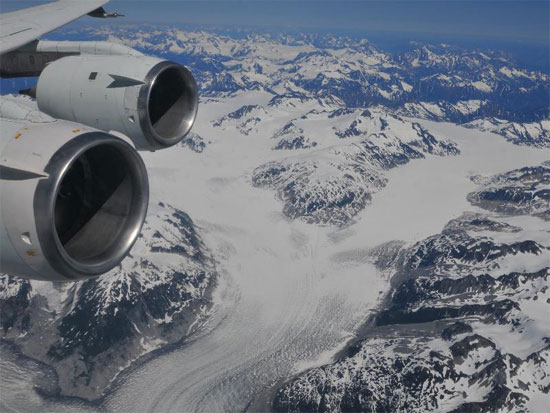20% of Canadian glaciers disappeared in this century
The team's report of the British Antarctic Survey, one of the UK's leading environmental research centers, said an increase in global average temperatures of 3 degrees Celsius (5.4 Fahrenheit) is enough to melt glaciers on northern Canada islands. Accordingly, 20% of Canada's Arctic glacier may disappear in this century.

Glacier British Columbia (Canada) taken from aircraft. (Photo: Reuters)
The Arctic has become the focal point for climate change signals with faster melting than all other regions of the world as global temperatures rise.
According to observations from satellites, the sea ice area covering the Arctic Ocean has dropped to a record low in September last year.
Jan Lenaerts, a research specialist at Utrecht University in the Netherlands, said the leader of the research team said: 'Even if there is an assumption that global warming slows, the ability to melt ice in the Arctic remains reached an alarming speed. And the chances of freezing become very difficult. "
According to Lenaerts, if the average temperature in the world increases by 3 degrees Celsius, in the Arctic, the temperature can rise to 8 degrees Celsius due to the so-called "feedback effect".
When snow and ice melt, the ground and sea surface will reveal, absorbing instead of reflecting sunlight, amplifying the change of temperature.
The loss of about 20% of the glaciers on Canada's northern islands will increase by about 3.5cm (1.4 inches) in this century, according to the study.
- Glaciers in Asia are unusually bloated
- Climate change may cause the disappearance of 5,500 Everest glaciers
- The Andes glaciers narrowed the record
- Warning of glaciers in Peru is likely to disappear
- Glaciers on Mount Mont Blanc are at risk of collapse
- Himalayas glaciers have been flawed for the past 40 years
- The world's fastest melting glaciers through satellite images 30 years apart
- The first glacier in the world officially 'died' in the era of climate change
- The discovery of glaciers is melting under the layer of dust on the surface of Mars
- Mexico will not have glaciers?
- The world's most dangerous glacier is about to melt, catastrophic with Earth?
- Detecting huge amounts of nuclear stored in Earth's glaciers
 Is the magnetic North Pole shift dangerous to humanity?
Is the magnetic North Pole shift dangerous to humanity? Washington legalizes the recycling of human bodies into fertilizer
Washington legalizes the recycling of human bodies into fertilizer Lightning stone - the mysterious guest
Lightning stone - the mysterious guest Stunned by the mysterious sunset, strange appearance
Stunned by the mysterious sunset, strange appearance